Feminist talk on “Respectful on Women’s Right” on 22nd March 2015 brought young women from a diverse background, meet together to discuss and share experiences from their work and study life. At the same time they were also asked to share about their challenges, especially in their field work. They are LBT young women activist, HIV, young women activist, young women using media and ICT and the university students. There were 10 young women who participated in this meeting.
Objective of meeting:
- Participants will be better understanding on the meaning of feminism and women’s rights and the perspective of implementer of women’s rights in a diversity fields.
- Challenges of implementation the women’s right in each sector.
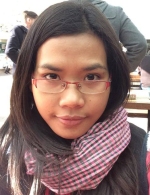 Prum Dalish, is working for Bit Vithey Chivit organization as team leader in the Cambodian Community of women living with HIV/AIDS (CCW) and her work as the program assistant. Work experiences: on HIV treatment literacy, sexual and reproductive health rights, Leadership and advocacy, Women’s rights (young people can know their rights), CEDAW, Community forum, Strategy development, Capacity building, others participation and education: ToT on sexual and reproductive health right. TOT on treatment literacy. TOT on human right. TOT global fund and young people. ToT on leadership for young key affected population, Gender and HIV, she has graduated from western university, Major English Language.
Prum Dalish, is working for Bit Vithey Chivit organization as team leader in the Cambodian Community of women living with HIV/AIDS (CCW) and her work as the program assistant. Work experiences: on HIV treatment literacy, sexual and reproductive health rights, Leadership and advocacy, Women’s rights (young people can know their rights), CEDAW, Community forum, Strategy development, Capacity building, others participation and education: ToT on sexual and reproductive health right. TOT on treatment literacy. TOT on human right. TOT global fund and young people. ToT on leadership for young key affected population, Gender and HIV, she has graduated from western university, Major English Language.
She shared her knowledge about women living with HIV, how she saw women with HIV face discriminate. Most of them are house wife, there is a gap between them and other women when it comes to education, and they are less educated. Furthermore, when they realized they are infected with HIV they deny service health and keep themselves isolated, they are scared to show themselves in public at events or ceremonies. Most young women who are infected with HIV never dare to show themselves out in public and accept that they are alive with HIV. They always ask themselves: “can I get married?”, because they don’t know what their rights are. Dalis is working to empower them to understand what their rights are? She and her team try to show them what a good role model is, how to be patient and educate them how to demand their rights and claim people’s respect for their rights. Most of them are not valued by society, she taught them to think it is normal if they accept health service, she also encouraged them not to act like useless people and think positive about the future. Additional social discrimination makes them become traumatized and brings them down emotionally. Most housewives were infected with HIV by their husbands and infection is passed on to their children. Currently their children are growing up with HIV, they are young women who live with HIV and they keep their story secret, moreover they are seeking partners without informing them. Often when their partners find out they live with HIV, they break up their relationship, and it makes those young women think in the wrong way by not accepting Health service and any of them even plan to infect other men.
Monireth Toy: The worst thing isn’t that they are infected with HIV, they can still have a good life, but we should have a strategy to protect them and prevent the disease from spreading.
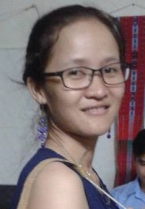 Loek Sreyneang is 24 years old and she is a freelancer and finished the RULE major of Law and now she is participation the short online course at Indigenous Women Global Leadership School on Human Right and Indigenous People Rights. She is Bonoung indigenous who from Ratanakiri province.
Loek Sreyneang is 24 years old and she is a freelancer and finished the RULE major of Law and now she is participation the short online course at Indigenous Women Global Leadership School on Human Right and Indigenous People Rights. She is Bonoung indigenous who from Ratanakiri province.
She said that indigenous young women’s access to education is limited, only one indigenous young woman was graduated with a master’s degree and 10 young women with a bachelor degree, because they are less educated and related to self-development, they always compare themselves with other people so they are without hope and less motivated. For indigenous families it is still common to send sons to higher education while daughters leave school at grade 9. Moreover, they need more encouragement and employment opportunities for society, but there is a lack of resources. They lose many work opportunities because their English is limited. Some young women did graduate high school, but they cannot speak English well. There are 24 indigenous groups, Bonoung is a big indigenous group, and most of them can understand at least 3 indigenous languages. Although women’s rights have been improved, but part of her culture and family, especially her father didn’t like his daughter to study in higher education. Everybody in her village said she is spinster, If compare her current status with other young women in her village, those young women were married by the young age. Indigenous people are friendly and happy, and the current situation is that old people stand up for their land rights, although it usually seems to be female participants that demand for their land rights. This is because women give a soft appearance which is a sharp tool to demand for their land rights as men don’t fight women as easily as they would fight other men. Land concession of government affects the indigenous people, they face to lose their land and some of them leave the forest.
Monireth Toy: Another reason why only 10 women had access to education is that Khmer people still keep in their stereotype that women are not smart enough to get an education.They thought that women cannot do anything besides getting married and do the cooking.
Cheng Mengchou: She went to Kampbark village at Ratanakiri province she saw young women brought their baby along with them, while they were studying in primary school level.
Loek Sreyneang: Some of the indigenous women are forced to get married at a young age, between 14 to 17 years old. Their career would be the farming in the forest, but the problem is that they don’t have land or forest to do the farming anymore. Some people migrate to Phnom Penh and some were cheated and grabbed their land by a company. Without any choices they often become workers at that company, with an income around 20000 Riels per day.
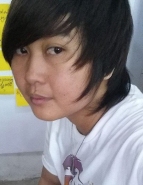 Chhoeurng Rachana (Tana) is She is working as a volunteer at Cam ASEAN involves 8 projects about a diversity of subjects ranging from youth to students, LGBT, disability, HIV and ICT. During a discussion about LGBT there was only a minority of women. 100% of parents tried to stop and break down their children when they found out that their children are LGBT. When the children try to make their voice heard in public, parents take them to spray spirit water at the pagoda because those old people thought their children are crazy or traumatized. Parents tried to split couples and some of them were expelled and cut off from economic support. Others were locked inside their house for a month, but even when they manage to escape from the home they have no place to go. How will their life turn out if they meet the wrong people or end up in a bad situation? Some of them don’t get the chance to study. LBT at school were required to wear skirts, so when they wear trouser they were punished. Young LBT face discrimination from family, at school, with friends and in society. This is the reason they migrate to Phnom Penh, but some working places don’t accept LBT to work in their place. She experienced herself, that even though he put in a CV and went to an interview She failed the interview for this reason she is LBT. Her friend works at a company and this company didn’t allow her friend to show out his real character in the public too, If she shows out the real characteristic she will dismiss from her work. She also mentions about some law in Cambodia: Labor law states that, by law, all people have the right to work, and in the marriage law since 2011 both men and women have the right to choose the couple to get married and an article stated in the old law (2004) “Both national cannot marry in the same sex” was deleted. Another point is that they cannot even use the toilet normally. If they use the women’s restroom, all of the women look at them in a strange way, but if they use the men’s restroom, they feel unsafe. He also shared about her personal life. She had the courage to present this feeling in public in 2012. Even though she already knew about her feelings since she was 11 years old, tried to be in love with a boyfriend, but it was impossible. She had the courage to talk on TV about her volunteer work. She confesses that she is an LBT activist, her parents still feel shocked when they followed the program on TV, but finally her parents accept her attitude. At the last sharing she also mentioned that some programs on TV discriminate and tried to persuade their presenter to wear a dress like the women, even though he does not want to.
Chhoeurng Rachana (Tana) is She is working as a volunteer at Cam ASEAN involves 8 projects about a diversity of subjects ranging from youth to students, LGBT, disability, HIV and ICT. During a discussion about LGBT there was only a minority of women. 100% of parents tried to stop and break down their children when they found out that their children are LGBT. When the children try to make their voice heard in public, parents take them to spray spirit water at the pagoda because those old people thought their children are crazy or traumatized. Parents tried to split couples and some of them were expelled and cut off from economic support. Others were locked inside their house for a month, but even when they manage to escape from the home they have no place to go. How will their life turn out if they meet the wrong people or end up in a bad situation? Some of them don’t get the chance to study. LBT at school were required to wear skirts, so when they wear trouser they were punished. Young LBT face discrimination from family, at school, with friends and in society. This is the reason they migrate to Phnom Penh, but some working places don’t accept LBT to work in their place. She experienced herself, that even though he put in a CV and went to an interview She failed the interview for this reason she is LBT. Her friend works at a company and this company didn’t allow her friend to show out his real character in the public too, If she shows out the real characteristic she will dismiss from her work. She also mentions about some law in Cambodia: Labor law states that, by law, all people have the right to work, and in the marriage law since 2011 both men and women have the right to choose the couple to get married and an article stated in the old law (2004) “Both national cannot marry in the same sex” was deleted. Another point is that they cannot even use the toilet normally. If they use the women’s restroom, all of the women look at them in a strange way, but if they use the men’s restroom, they feel unsafe. He also shared about her personal life. She had the courage to present this feeling in public in 2012. Even though she already knew about her feelings since she was 11 years old, tried to be in love with a boyfriend, but it was impossible. She had the courage to talk on TV about her volunteer work. She confesses that she is an LBT activist, her parents still feel shocked when they followed the program on TV, but finally her parents accept her attitude. At the last sharing she also mentioned that some programs on TV discriminate and tried to persuade their presenter to wear a dress like the women, even though he does not want to.
Kimheng Tan: Say that Say that there is 1.5 of LGBT population in the world, 46 countries is discriminate LGBT in the world.
.
Vuch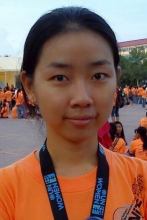 Nea Chhay: is 20 years old, she is currently a third-year student in The English Department of Institute of Foreign Languages, Royal University of Phnom Penh. She is passionately interested in education and social work. Nowadays she is an English teacher at Youth School of Empowering Youth in Cambodia. She used to volunteer with The Khmer Youth Association (KYA). In 2014, She got selected as the KYA representative to work with UN Women. She volunteered with UN Women in a role as a young champion representative for ending violence against women and girls.
Nea Chhay: is 20 years old, she is currently a third-year student in The English Department of Institute of Foreign Languages, Royal University of Phnom Penh. She is passionately interested in education and social work. Nowadays she is an English teacher at Youth School of Empowering Youth in Cambodia. She used to volunteer with The Khmer Youth Association (KYA). In 2014, She got selected as the KYA representative to work with UN Women. She volunteered with UN Women in a role as a young champion representative for ending violence against women and girls.
Vuch Nea: KYA is the place where she starts volunteer work, and KYA send her involve young champion end violence against women, she also has volunteer capacity training on fundamental right training to children and Beong Kork Lake community.
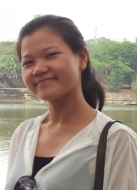 Mouyleng Lim is 24 years old, currently working as a Junior Software Developer at InSTEDD iLabSEA. I have graduated from ITC (Institute of Technology of Cambodia) majoring Computer Science in 2014. Moreover, she is also a graduate student from UP (University of Puthisastra) majoring English Language in 2013. In 2010, she got a priceless chance to participate in an exchange program (JENESYS) to Japan for 10 days. Last but not least, she has volunteered as a Math teacher at ITC in 2011. Lastly, she has also interned at Udaya Technology Co.,ltd for 3 months and at InSTEDD iLabSEA as the developer.
Mouyleng Lim is 24 years old, currently working as a Junior Software Developer at InSTEDD iLabSEA. I have graduated from ITC (Institute of Technology of Cambodia) majoring Computer Science in 2014. Moreover, she is also a graduate student from UP (University of Puthisastra) majoring English Language in 2013. In 2010, she got a priceless chance to participate in an exchange program (JENESYS) to Japan for 10 days. Last but not least, she has volunteered as a Math teacher at ITC in 2011. Lastly, she has also interned at Udaya Technology Co.,ltd for 3 months and at InSTEDD iLabSEA as the developer.
Mouyleng: she said she is lucky that her program manager are understanding gender perspective relate with ICT at her working place, they promote both women and men are equal, and the staffs have the equal right, the challenge that her face, life of the developer must think more on the innovative technology developing, facture statute or photo we must create, learn and find the solution and update every time, for technology developer must adopt it and self-realize many softwares such Java or android and it is must update anytime.
Monyvann Nhean: what was made or encouraged you to study in ICT field?
Mouyleng: She learnt ICT because she found this is the great subject, she can understand new technology and web security. There are only 10 young women among 50 students studied the same filed, and the same generation. While she studied in high school, she never used a computer or played the game, but when attended fresh year at her university, she had chosen chemical science subject and she got mentoring from second year student, and made her realize which real subject that she will choose for her career life, for example, if she choose to study architecture subject she must stand outside for construction building, and while there are many young women already chosen chemical science subject. So finally she made her own decision to choose ICT subject, because she just wants to sit at one place, update and develop software.
Mengchou:Did the men flirt or bother her at school? Because this subject most of student are men. Mouchleng: She was the outstanding student at school, so everybody encouraged her.
.
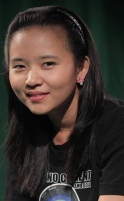 Cheng Mengchou, is 21 years old, she is currently a senior student majoring in media management at the Department of Media and Communication, Royal University of Phnom Penh. She is passionate about journalism-related studies and work. During the 2013 national election, she was doing a two-month internship with Radio Free Asia based in Phnom Penh as a news reporter and newscaster. In 2014, she got selected for an overseas internship with The Nation Multimedia Group at Thailand where she worked as a TV reporter. Early this year, she won a chance to learn about Japan’s mass media field through an exchange program called JENESYS.
Cheng Mengchou, is 21 years old, she is currently a senior student majoring in media management at the Department of Media and Communication, Royal University of Phnom Penh. She is passionate about journalism-related studies and work. During the 2013 national election, she was doing a two-month internship with Radio Free Asia based in Phnom Penh as a news reporter and newscaster. In 2014, she got selected for an overseas internship with The Nation Multimedia Group at Thailand where she worked as a TV reporter. Early this year, she won a chance to learn about Japan’s mass media field through an exchange program called JENESYS.
Mengchou:currently through her observation on women’s right in Cambodia are better than before, but do not compare with other country in the world, why did I see, it is good? Because many universities, both private and public in Phnom Penh create many opportunities for young women can access to media subject. There are young women are encouraged to apply to many job opportunities. Life in women journalist, sometime are difficult, especially when she communicated and interviewed with people, because of the behavior of people and social stereotype are not complete value of women in this field. Moreover relate journalist field, they need to work at the night time that is the challenge for the woman journalist in Cambodia, she used to volunteer at international media, she needs to leave office at 9:00 PM, but she was feeling unsafe. When she was in high school her parents used to guide her that she should choose career relate to banking, accountant, but she is not following her parents’ advice she decided to study media and her parents seem not full support her studying this field and working as a journalist too. But in her personal feeling love social science. She used to volunteer as a journalist in Thailand, the journalists at there were value and protection, and with their professional, but be honest behaviors of Cambodian society are less respectful their profession, one day when she go to interview at one department, she was flirting by security guide, she feels uncomfortable with such kind of men less value to the women, because of them less education.
Conclusion:
Young women are facing challenges in any fields, even though some of them got opportunity to access in higher education, but the stereotype of men and society are still not value and less encouragement them in any field works, for indigenous people needing empowerment more on women’s right, marriage law and gender equality and also land and forest are their spiritual, Women live with HIV are face of discrimination especially LBT is deeply discrimination not only social norm but also society.
Somehow, through discussion, some young women are personally independent and strongly lead their own life with their own decision. This is mean that when women are being able access more information and higher education, they can lead their own destination.

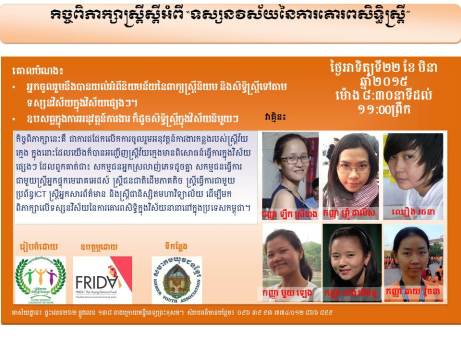
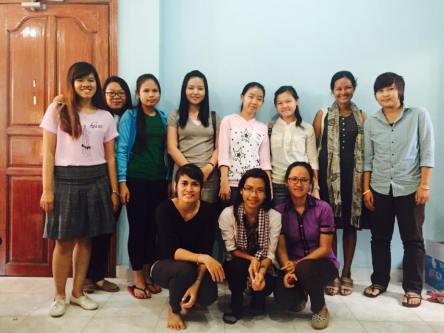
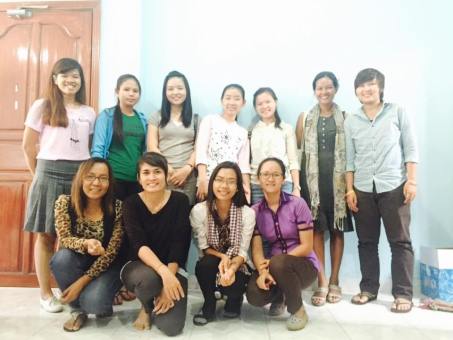
Pingback: Meet the feminists changing the world for girls from Kenya to Egypt | Global Development Professionals Network | The Guardian | Mark Geoffrey Kirshner
Pingback: Meet the global feminists changing the world for girls from Kenya to Egypt | Mihaela Drăgan
Pingback: http://www.theguardian.com/global-development-professionals-network/2015/apr/13/meet-the-global-feminists-changing-the-world-for-girls-from-kenya-to-egypt | Mark Geoffrey Kirshner